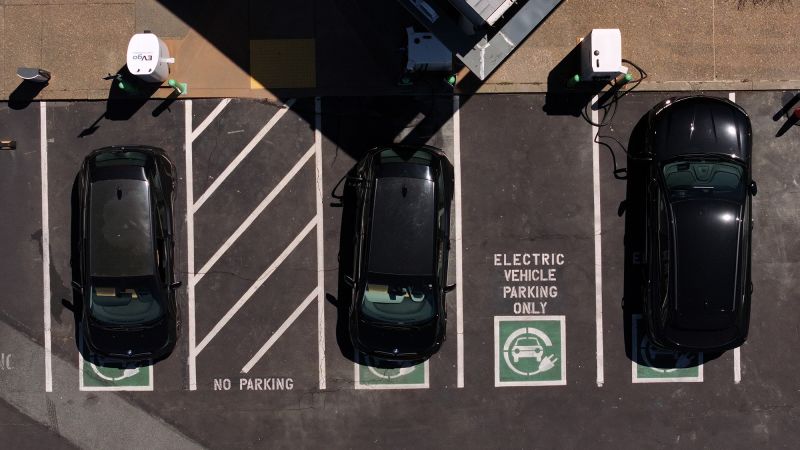The future of electric vehicles in America looks bleak. But the auto industry isn’t giving up

Just a few years ago, the U.S. auto industry had a vision of an all-electric future. He has since abandoned that speech after the Trump administration eliminated federal government incentives for the technology.
The near future does not look very pretty. The end of the $7,500 federal tax credit for electric vehicles is expected to depress sales in the coming quarters and perhaps years to come.
But the global auto industry hasn’t completely abandoned electric vehicles. Automakers continue to invest in an electric future, even if it’s not all-electric, as they had planned. The auto industry remains uncertain about the regulatory future of gasoline-powered cars in much of the United States as well as other markets around the world. And they don’t want to lag too far behind the massive rise of electric vehicles in China.
“They have softened their stance on an all-electric future,” said Daniel Ives, a technology analyst for Wedbush Securities. “I believe Ford, GM, Stellantis and many other automakers will continue to move aggressively down the electric vehicle path. But they are moving down this path more cautiously than they were a few years ago.”
The end of a $7,500 federal tax credit a week ago sparked a sell-off of electric vehicles overvoltage During the third quarter, interested buyers rushed to acquire a car before the rebate expired. Tesla (TSLA), Ford (F) and General Motors (General manager) all sold more electric cars than ever before, with GM in particular selling more than double the number of electric vehicles in America compared to the previous year. Tesla’s sales rise came after six straight months of falling numbers.
But after this sharp rise, EV sales for the rest of the year will likely come back to Earth with a thud. And it is unlikely that they will recover for a long time afterwards.
While 10% of all cars sold in the U.S. last quarter were electric, Ford CEO Jim Farley said last month that he expects electric vehicle sales to fall to 5% of the U.S. market, which would be down from about 7% of the market last year. General Motors Chief Financial Officer Paul Jacobson said his company also expects “demand for electric vehicles to decline quite precipitously.”
Despite this gloomy outlook, Ford announced in August a A $5 billion investment in electric vehicle productiona move he called “the next Model T moment,” a reference to the Ford car that helped bring internal combustion vehicles to the mass market more than a century ago.
“I think it will be a vibrant industry, but it will be smaller, much smaller than we thought, especially with the policy change,” Farley said at a recent corporate event.
Hyundai also said it would not reverse plans to invest in electric vehicles in the U.S. market, even after immigration officials were arrested. 475 workers at one of its new electric vehicle and battery factories under construction in Georgia.
But Hyundai CEO José Muñoz emphasized at a recent investor day that the plant would be able to more easily shift from building electric vehicles to traditional gasoline-powered cars based on market demand, which was part of the company’s plan.
Part of what pushed automakers to move to electric vehicles in the first place was federal Biden administration regulations that aimed for electric vehicles to account for 50% of the U.S. new car market by 2030, and would have imposed heavy penalties on automakers that fail to meet the goal.
These regulations were mostly canceled under the Trump administration. Heavy financial penalties for violating emissions limits were also removed in the tax and spending bill passed by Republicans in July.
California and eight other states – Massachusetts, New Jersey, New Mexico, New York, Oregon, Rhode Island, Vermont and Washington – had also imposed mandates that would have essentially banned the sale of gasoline-powered vehicles by 2035. These states alone account for about a quarter of U.S. car sales.
But Congress recently moved to end California and other states’ ability to impose their own stricter emissions rules. That battle has been brought to federal court, and the battle could take a long time to resolve — so long that changes in administrations over the next decade could ultimately put this ban back in place as early as 2035. Europe and China are also moving forward with their own stricter emissions rules that could force purchases of electric vehicles.
Automakers were also seeking much higher stock prices with their electric vehicle plans. Tesla has a market capitalization far greater than any other automaker, even though it only sells a fraction of the cars that each of them sells. That’s been the case for years, even before CEO Elon Musk and the company’s fans on Wall Street began talking about its ambitious, but yet-to-be-realized, plans for robo-taxis and robots that will increase the company’s value in the future.
Rather than focusing on 100% electric cars, car manufacturers are focusing on hybrids.–vehicles equipped with both electric motors and internal combustion engines (ICE).
“There’s still an aggressive push for electric vehicles. But ICE is no longer a four-letter word,” Ives said. “They’re going back to their roots.”
And U.S. automakers say they haven’t seen the same market demand for fully electric vehicles as they have for gasoline-powered cars.
The regulations that had been put in place under the Biden administration “put us in a box that ultimately would have resulted in a much smaller U.S. auto industry, because we would not have been allowed to sell the internal combustion vehicles at anywhere near the volume that we would have sold them,” GM Chief Financial Officer Jacobson said during GM’s investor presentation last month.
He said that despite these regulations and support for electric vehicles, including the $7,500 tax credit, “customers have not adopted the model at the pace the government wants.”
But Jacobson said GM still envisions long-term growth in demand for electric vehicles, even without the tax credit and other support for an all-electric future, and that the company is working to meet that growing demand for electric vehicles.
“We need to let the situation settle and understand where this natural demand (EV) is in the future and how can we meet it,” he said. “It’s going to take a little while. We’ll probably have to adjust our footprint a little bit.”
Electric vehicles remain attractive
Automakers also find electric vehicles attractive for competitiveness reasons: It takes fewer labor hours to produce an electric vehicle than a gasoline car — with its complicated engine and transmission — making them potentially more profitable for automakers than traditional gasoline cars.
And demand for electric vehicles could start to rise again if the cost of producing electric vehicles, particularly batteries that account for a large portion of the cost of electric vehicles, continues to fall. And virtually every automaker is announcing plans for less expensive battery technology.
As part of its $5 billion electric vehicle investment plan announced last month, Ford said it would soon sell an electric pickup for $30,000, making it one of the most affordable available. For comparison, the Ford F-150 Lightning pickup has a starting price of around $55,000. The new lineup to build this more affordable EV pickup should be operational by 2027, Ford said last month.
And Ford still believes the world is changing, even if it’s changing more slowly than initially thought.
“We took inspiration from the Model T – the universal car that changed the world,” Doug Field, Ford’s head of digital and electric vehicle design, said Monday. “We believe today will be a turning point for Ford Motor Company and the automotive industry.”
ـــــــــــــــــــــــــــــــــــــــــــــــــــــــــــــــــــــــــــــــــــــــــــــــــــــــــــــــــ
Soon, there will be articles covering various topics, such as:
Insurance, Loans, Mortgage, Attorney, Credit, Lawyer, Donate, Degree, Hosting, Claim, Conference Call, Trading, Software, Recovery, Transfer, Gas/Electicity, Classes, Rehab, Treatment, Cord Blood, Best mesothelioma lawyer, Truck accident lawyer, Buy life insurance online, Business VoIP provider, EMR software for clinics, Structured settlement companies, motorcycle injury lawyer, motorcycle injury attorney, spinal cord injury attorney, birth injury attorney, auto accident injury attorney, spinal cord injury lawyer, car injury attorney, motorcycle accident injury attorney, catastrophic injury lawyer, birth injury lawyer, workplace injury attorney, motorcycle injury attorneys, head injury lawyer, personal injury attorneys, traumatic brain injury attorney, train accident lawyer, brain injury attorney, auto injury attorney, serious injury attorney, personal injury lawyer, truck injury lawyer, injury attorneys, back injury lawyer, injury lawyer near me, injury lawyer,
If you would like to see these articles, please write so in the comments.




